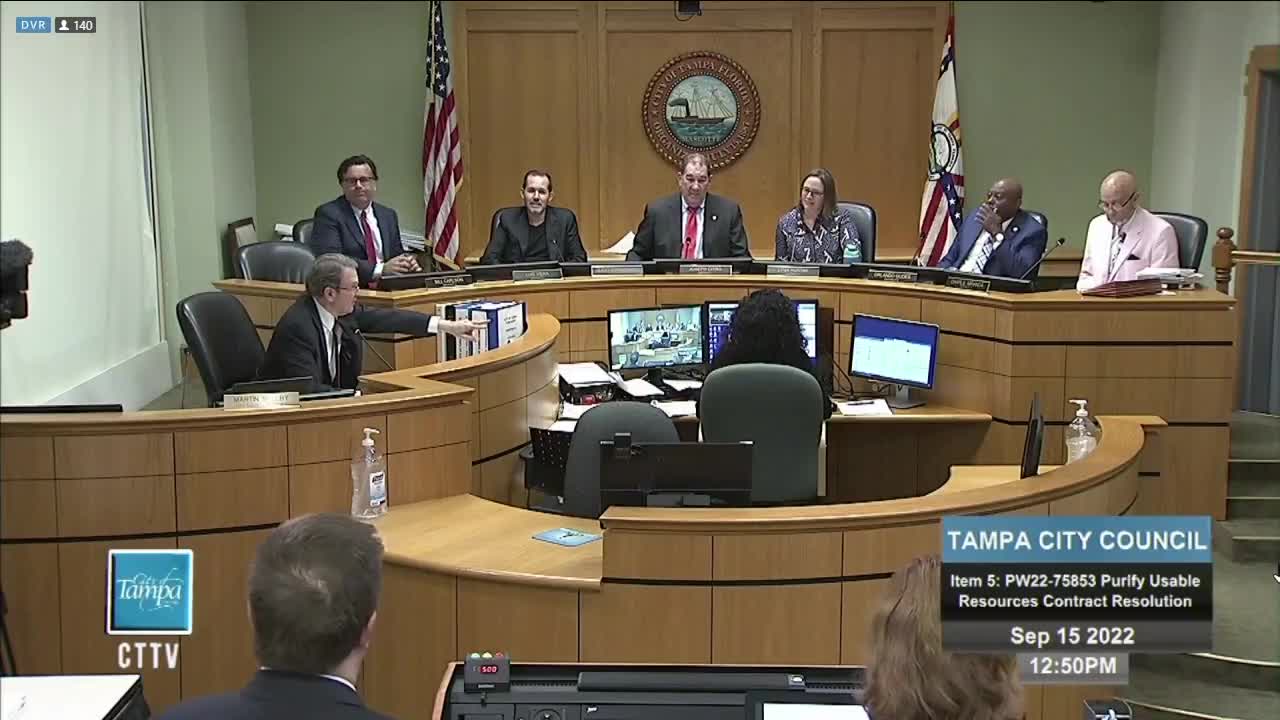TAMPA, Fla. — The Tampa City Council put the brakes on a project that is looking to repurpose city wastewater.
The council, in a unanimous vote, halted any new funding for the PURE project.
"I don't want to fund this anymore," said Councilwoman Lynn Hurtak. "To me this is it. This is done. If we need to do something different, we'll deal with it in a different way. I don't anticipate approving any more funding for PURE as it stands and to me, that is closing it. I understand legally it's a little different, but to me, it's a closure."
RELATED: Opponents of PURE proposal claim it will lead to dangerous drinking water
The Purify Usable Resources for the Environment (PURE) project was a proposed water recycling project. The City of Tampa said the project would redirect up to 50 million gallons per day of "highly treated reclaimed water" from the city's Howard F. Curren Advanced Wastewater Treatment Plant that would have been put in Hillsborough Bay.
Tampa officials said that water would be "purified to exceed federal and state drinking water standards and repurposed for beneficial use."
This is all connected to Senate Bill 64, which calls on municipalities across the state to find new uses for wastewater discharges that aren't helpful for the environment. And they have to do it by 2032.
In Tampa's case, when it comes to that wastewater, the city's Sustainability and Resilience Officer Whit Remer says they are considering several options—which include repurposing that water as drinking water.
"There are options to make sure the reservoir stays full of water the dam. To put the reclaimed water below the dam. Do deep well injections. To do some form of aquifer storage, do recovery recharge," he said, "I want to be clear that there's no project right now that the city selected. We're not saying that we're going to use the reclaimed water for drinking water purposes. The city as we've stated many, many times is studying a plethora of options,"
But many, like Hurtak, are confused as to whether or not these options are truly necessary to keep Tampa in compliance with SB 64.
"We have this senate bill that says we can't fo outflows anymore. Okay, well what's the best and worst case scenario of that? Is there a fine? Is there nothing? What can happen?" said Hurtak, "We heard loud and clear that people do not want this injected into the aquifer. They do not want to possibly drink the water with chemicals."
ABC Action News spoke to some of those people who represent many different groups across the area, like Phil Compton with Friends of The Hillsborough River.
"There are no standards for all of these new contaminants. And well, it's an inconvenient truth and they don't want to acknowledge that," he said.
Instead, they tell us the drinking water option needs to be scrapped. And they add that the PURE project team needs to go back to the drawing board and bring back a better explanation of what they're trying to do and why.
"I'm an engineer by training, by profession and I'm looking for what problem are they really trying to solve?" said Nancy Stevens of the Tampa Bay Sierra Club.
It's something Councilwoman Hurtak and many other council members agree with—which is why they denied the PURE project team the extra funding Thursday. And they instead asked them to take some time to answer questions raised by the council and the community.
"For me, it was about 'let's stop and look at this clearly' and start from there," said Hurtak.
So what happens next?
Well, first the PURE project team has been asked to ask the Florida Department of Environmental Protection (DEP) if Tampa can be exempt from Senate Bill 64 because there's a chance that the treated wastewater currently released into the Hillsborough river is actually helpful.
Those answers are expected in November.
Then in December, the PURE team will be providing answers to 17 questions that community stakeholders have asked about the project, what it would cost and what it hopes to accomplish.
17 Questions PURE by ABC Action News on Scribd
And finally, in February, both the PURE project team and community experts will come together for a public workshop where they can provide an explainer of their findings and answer questions.
The History
While turning wastewater into drinkable water is just one of several options the PURE project is considering—but it seems to be the one grabbing the most attention.
ABC Action News did some digging and found that this proposed solution isn't new to Tampa.
For more than 10 years, various city leaders have thrown some variation of that idea out to the community—but it has been shot down every time.
Though this time around, Councilman Joseph Citro claims they're being forced to consider it again because of Senate Bill 64.
"Water use with non-potable reclaimed water was eventually going to be done by the city of Tampa. However, senate bill 64 came along and forced our hand and made us rush into it," he said.
He went on to encourage people who were unhappy to contact their local legislators.
"According to city estimates, if the PURE project had been approved, construction would have begun in 2024 at the earliest and not be completed until 2031. The plan was to cost between $484 million and $628 million.



